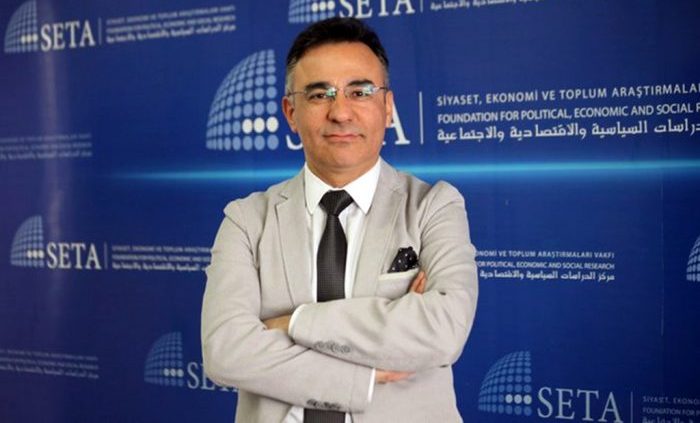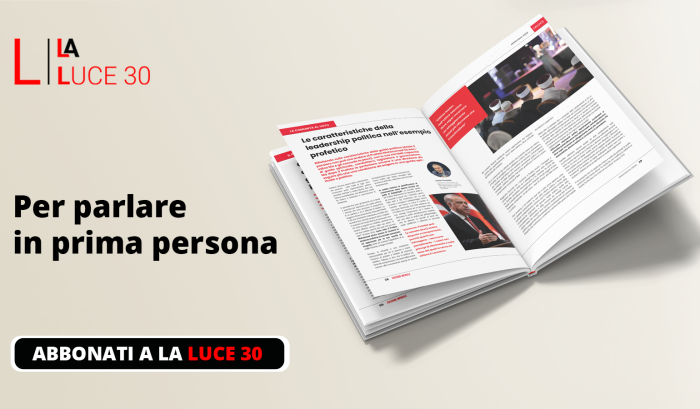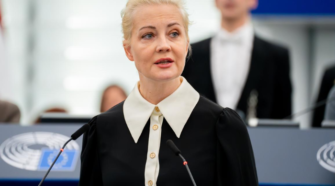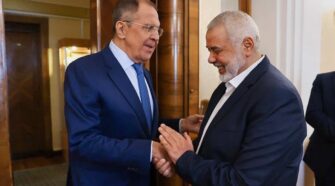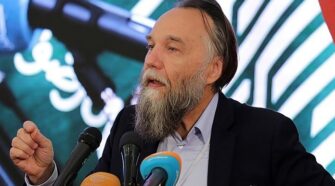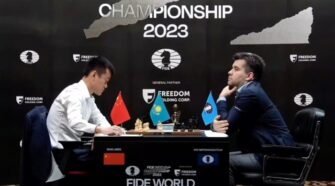After more than 25 years spent as an officer in the Turkish Armed Forces, Murat Aslan He is currently teaching in Istanbul Sabahattin Zaim University and Researcher in Security Studies Directorate of SETA, his studies are focused on intelligence and propaganda in the fields of defense and security studies. We interviewed him about the conflict in Ukraine and specifically about the ongoing negotiations in Istanbul
Why is Turkey playing the main role for what concerns the Russia-Ukraine peace negotiations?
In accordance with the prerequisites of being an ally member of Nato, Turkey is assisting Ukraine both politically and militarily but still maintaining ties with Russia in order to soften the atmosphere. In fact, they have understood that the more you push Russia the more the consequences will be drastic.
Turkey has managed to find a compromise which also meets the interest of western countries. Its foreign minister is regularly being in contact with Russia and Ukraine’s foreign ministers. They have started their discussions in Belarus and there is a hope that Putin, Zelensky and Erdogan will meet in Turkey in order to develop the discussions.
It is said that Russia will negotiate only if it feels under pressure. From your point of view, Russia has not to be pushed to the corner. How can balance be found between these two options?
Generally speaking, Russia doesn’t give up until it meets its military defeat.
Regarding the Ukrainian issue, it is important to take in consideration some dynamics which will affect Russia’s decision to comply with the terms of probable agreements.Those dynamics are related to Russia’s self-perception, in the sense that Russia is now assessing if its military capacity will allow it to achieve its goals.
Public opinion, will as well influence Russia’s behavior when a great number of Russians leaving in west will show in an incessant way their unhappiness with the ongoing conflict.
Another reason for which Russia would hesitate with not going on with the conflict is related to how the international pressure (sanctions) is affecting Russia’s public sphere both economically and psychologically. But still, when Russia starts to perceive a direct threat to its land, it will feel the duty to react, utilizing exaggerated forces.
So, coming back to your question in order to find balance, it is important to offer Russia a table where Russia can express itself, a table where mediators will show Russians that they are going to lose if they act and what they are going to gain if they accept to negotiate.
Today, negotiations are more beneficial for Russia, giving that Ukrainians are managing to defend their land efficiently. Therefore, if Russia is not able to increase its forces on the ground, it may lose all the advantages the have acquired in Ukraine so far.
Another supposition could be that Russia is using negotiations as a distraction just to gain time in order to supply its army.
How could be negotiations possible without the presence of the United States at that table, giving the role they have in supporting Zelensky’s government?
Well, it is a fact that this conflict does not directly interest United States.
At the same time, NATO clearly perceives Russia as a challenger. Somebody calls it the second cold war and we will see a long-term strategy from Nato allies and United States aimed at making Russia more manageable.
I don’t think that Russian-Ukraine war can be concluded by a multilateral agreement, it must remain between the countries involved. If you extend it, the number of topics to discuss would be too much risking to lose focus on Ukraine.
Is the Ukrainian government independent enough to take any kind of decision alone?
The actual picture indicates this reality: NATO provides material support to Ukraine which is showing an efficient resistance. Ukraine, in fact, managed to shatter Russia’s plan to capture the whole country in few weeks. Now Ukraine has the leverage to bargain at the table right now.
If EU’s support continues with this momentum Ukraine is capable of negotiating everything.
Having the US as an indirect actor in this scene is much safer in terms of global security and peace otherwise misunderstandings and miscalculations may endanger global order. If Russia perceives that Us is directly challenging it, a new wave of “responding to the American threat” will commence.
Would Russia accept a deal excluding Ukraine’s neutrality and is Kiev willing to lose its access to the Black Sea?
It depends on what kind of neutrality we are talking about. If it is about demilitarizing Ukraine, I don’t think that Ukraine will accept it viewing the huge war Ukrainians are experiencing right now.
Instead, if by neutrality we mean that Ukraine should not be a member of NATO, then clear security guarantees should be provided. Ukraine had actually received those guarantees in 1996 while handing over the nuclear warheads to Russia. Russia, for its part, attacked despite its promise to not attack.
Minsk agreements were violented as well, weren’t they?
Well, this does not give Russia the right to attack, there were other options actually. If there is the intent to start a war, this must be declared. Russia said that this is a peace operation but those peace operations must rely on the UN security council.
Hasn’t Turkey made the same with the Operation Peace Spring in northern Syria?
Turkish operation in Idlib in 2020 was based on the agreements with Russians and Iranians. This operation is under article 51 of the UN charter. Furthermore, there is another solid base for the Syrian’s case which is the Adana agreements. They clearly indicate that if Assad regime allows any terrorist formation to be trained or to attack in Syria, then Turkey has the right to intervene.
As you can see there are many agreements on this case. If you compare it to the Russian invasion, Russia declared that they are doing peace support operation, they can’t actually do it. The UN security council must act first by a resolution.
Politically speaking, Russia can declare what it wants but this is a technical issue, this is a clear aggression by Russia.
For what concerns the neutrality, again, there must be security guarantees which can meet Ukraine’s interest. Therefore, there has to be another country, they have proposed Turkey, China, Israel which observes the neutrality and in case of its violation those countries can intervene. Neutrality is a technical issue and its context must be clarified before a signature.
At the beginning of this conflict, Russia went northeast in order to capture Mariupol in a way that it can demand the right to maintain security in the Russian populated areas. On the other hand, its advance towards northwest was intended to surround Odessa, important for the control over the Black Sea. So, Russia targeted Odessa giving the presence of natural gas reserves in the Black Sea discovered by Romania and Turkey. Then when Russia will have control of the norther part of the Black Sea, they will enjoy more resources in this region.
After the demise of the Soviet Union, Russia started to stagnate. Now, the further phase of a stagnation for a State is retreat. Russia have perceived the coastal area of the black sea as a critical decisive point, once they have lost land over there, the dream of reaching the hot seas will diminish. Therefore, Russia wants to assure that it will have a hand in the black sea as much as it can in order to transform this stagnation to another expansion.
Does the Russian’s domination of the Balck Sea worries Turkey?
No, this concerns Russia. Turkey’s economic zone in the Black Sea is clearly demarcated by clear agreements with the neighbouring countries.
The common geopolitical reading of this situation says that Turkey is getting worried about Russia’s control over the northern part of the black sea, what is your take on this?
A Russian domination extending from the east to the west in the northern part of the Black Sea is something new for Turkey and it will just activate an alarm in the Turkish security perception.
Turkey has discovered a huge gas reserve in its own exclusive economic zone, a conflict will definitely bother its activities giving that Turkey is an energy dependent country. Stability in the black sea is essential for Turkey, it doesn’t want to live another cold war close to its borders viewing that Turkey has been always negatively affected by crises.
For instants, Turkey has lost a lot when the American intervention after the Kuwait invasion of Iraq happened, despite Turkey not being part of the Intervention.
The same occurred during American’s invasion of Iraq in 2003 and in Syria, therefore Turkey does not want to experience another crise especially viewing that many great intellectuals had foreseen that a great economic crisis is approaching the globe.
What is your point on what concerns the Europeans attitude regarding these peace negotiations, taking in consideration also that apparently European’s interests aren’t lined up with USA’s ones?
Well, EU is not that United when it comes time to face a political and military problem. EU is composed by 27 members and they all have different agendas. At the very earliest phase of this conflict Croatia, for instance, argued that it will not send any of its soldiers to face Russians, Germany was also hesitant. A normal behaviour as they all have different agendas but there has to be consistency in terms of treating other countries.
Accordingly, what I see missing in the EU’s mentality is a lack of vision. By this I mean that EU has to have a clear vision of itself in the next years. If EU does not have a clear vision of itself then it cannot identify general principles and an agreed policy to follow.
This Russian aggression in Ukraine is a clear indication that the EU started to think in an united manner that is a good thing by the way. On the other hand this united thinking must be institutionalised, there must be a mechanism in the EU to respond to such threats. Let me go to Turkish relevance to this standing. I will use an analogy. There are 27 individuals in a boat trying to reach somewhere. They tell Turkey to swim. “We are in the boat, we eat, we drink and you swim!” and Turkey is a candidate to jump on the boat just swimming. Then Turkey has more muscles than expected because swimming develops muscles. Therefore it is strong enough to fight with sharks in the water.
Then, when people in the boat see the sharks they say to Turkey: please manage it! Turkey can do it but everybody should be fair and just. EU must review the Turkish strategy, if they want to have or not Turkey in the EU, they must be frank. If they do not want to receive Turkey they must be frank and Turkey may just pursuit its own principles and policies and EU must not be concerned if Turkey is more autonomous.
And it is also valid for the members of EU that are also NATO’s members. We can think about them as having two hats, sometimes wearing the hat of EU and some other times wearing the one of NATO. Turkey is aware of the face, not of the hat! If Turkey approaches a kind of threat in the coming decades, because of its isolation, EU should review the strategy towards Turkey.
When we are having some sorts of meetings (I don’t want to name countries or foundations or think tanks), when they are holding some events, the ones that we are listing are always the proposing ones, either European or Turkish but there must be objectivity! Europe has to be consistent and a bit fair with this!
You are talking about Turkey and EU relations but also reclaiming NATO membership. I think after 2016 coup and the issue of S400 system that Turkey bought from Russia, the country is behaving, now, in a different manner. It is not implementing sanctions against Russia, as United States asked everybody to do and has also received the assets and investments of Russian businessmen…
I don’t know, I have not exactly analysed who invested what nowadays
But we know Turkey didn’t put any limitation, no sanctions on (Russian) individuals, enterprises, capital, banks. Then we know that Turkey’s position is in the middle, it is not adhering to NATO’s decision and I think this distension is coming from the coup of July 2016. I think the exit of Turkey from NATO is not a possible scenario in the short term. I see, indeed, its circumstances in the NATO are very difficult now but, at the same time, I see Turkey can help NATO because of its position and the chance it has to talk with Russia or other countries considered as enemies. What do you think about that?
Ok, first let me review the snapshots of the events. In the years 2012-2013-2014 we had gas incidents and plots to the government through prosecutors and judges. In 2015 PKK was in the city centers at the South-East portion of Turkey. It was a great turmoil for Turkish security perception and the reason for this was twofold. PKK wanted to prove its eligibility — to the US — they can fight against ISIS. Also they thought they could just import the crisis from Syria into Turkey but they couldn’t manage it! In 2016 we had the coup attempts by the Gulenist movement. I was in the high schools till 1987 and I could realize the Gulenist offshoots in the high schools were shocking at those times. They (Gulenists) were not thinking in the regular way but they were brainwashed!
Then they were the ones who started the coup attempts in 2016.
After all this traumas in every one or two years, in the occasion of the Syrian crisis, for example, Turkey wanted to align its policies with the ones of the US.
Turkey clearly proposed to the US that all countries would act together in Syria or if they wanted Turkey could act on their behalf. And US started a joint training and donate program for Syrian national army, which was then named “Mother Opposition”. American trained 60 people with 600 million dollars. 60 people are nothing to confront ISIS. And then they said: we will do it with PKK and other opponents of Turkish government as well but that was totally against the interests of Turkey and there was one escalation. In the main time there were other issues with US, for instance regarding the S400 system. Turkey first knocked at the door of the US and they have said: no!
Turkey signed an agreement with Italy and France to procure SAMP-T air defense system. They have frozened it. What Turkey can do is to search any defend system either from China or Russia. It was before China rather than Russia offering good prices and Turkey procured S400. There was a reaction in NATO but on the other hand there are some facts on this.
First thing: we have NATO’s member states who have procured S300, they have huge Russian arsenals in their inventories so when they came to Turkey they said: no, this is not tolerable!
Second thing: there is a huge crisis going on in Syria and Iran. US and Europe are really concerned about the probable Iranian missile attack to transatlantic area and they have located a radar in the district of Malatya City in Turkey.
Who will protect Turkey from these missiles? If there is an escalation many missiles will pass and Turkey cannot protect itself. This in unacceptable! And another issue: Who can guarantee the Assad regime will not deliver a missile to Turkish territory? Who will defend Turkey? This means we need a national asset protecting our vital space!
Another issue: when you start manufacturing weapons you have to import some staff and for this we are facing the effects of sanctions and also from covered sanctions (in the case nobody is openly declaring Turkey is sanctioned).
Coming to the exit from NATO, there is not any mechanism through which NATO can expel any member state. There were two exceptions in the history of NATO; we are talking about France and Greece but they were not expelled. They voluntarily applied to NATO that they would not be NATO members anymore. Interestingly, it was 1982, Turkey accepted the membership of Greece to NATO another time. I don’t see any argument according to which Turkey must exit NATO or must be expelled from NATO. It is not realistic. Just go and visit Berlin, no people walking around. There is a great gap in terms of Human resources, in Europe, for unqualified labours. You cannot construct a building, you cannot find easily employees. Europe needs a populated country, in case of serious threat. Therefore it is not wise — for Europe or for US — to argue Turkey should be expelled from NATO, because somehow, in some dates, Europe will need Turkey to defend itself.
Do you think this crisis will bring the world to a new system of international relations? Do you see some changes arriving in terms of multipolarity?
I have just drafted an article for a newspaper. We were all focused on geopolitics during the cold war, based on deterrence, containment policy etc. In the nineties there were multiethnic wars and genocide in Ruanda, Bosnia and Chechnya that mobilized our sense of security. But were local wars, not global. Right after 9/11 there were new sorts of threats in the form of soft threats and global war on terrorism and that’s the biggest fault the US did. In fact the US think that you have to treat the captured terrorists as prisoner of war but you know you must offer them some rights, well? We started to discuss the new threat times beyond modernity; hybrid warfare for instance digital warfare space competition etc pandemic diseases
Right now today right after this crisis we read discovered geopolitics, scrolled back to the original statics of settings of conventional warfare. On the other hand we can’t forget the nearly emerging threat types; what I mean is that we are entering a new phase of international environment and we can enjoy a risk of conventional warfare, unconventional warfare, symmetry, asymmetry, regular warfare, irregular warfare hybrid warfare with proxies etc. In the meantime we will try to manage the consequences of the climate change: pandemic diseases maybe an economic devastation in the coming decades, maybe years I don’t know and also social and cultural shocks because of this increasing pattern of immigration. Now conflicts will be much more complex and complicated that states will not be able to respond even though they react in a collective manner so these concepts in international politics must be identified that will actually limit the consequences of this complexity and we will see.
For a long period after the end of the Second World War and after the end of the Soviet Union we saw just one big actor in the international issues allowed to use his force in different war theatres: United States but in the last decades we saw new actors; global or regional powers like Russia or Turkey that are competing with the United States or with France intervening, for example, in Africa (the traditional influence area of France but, we know, it is not the only actor in the continent). Indeed we saw Turkey in Libya, in Somalia, in West Africa. Russia was in Libya, in Syria of course but, recently, also in Mali. World is changing…what do you think regarding what happened in Syria where Iran and Russia succeeded in maintaining Bashar Al Assad in power after having destroyed all the country. Then do you think Russia is becoming more attractive for many dictators and/or regimes?
As you remember we had bipolarity, right after the cold war we had unipolarity and the US called itself as not superpower but hyper power, later then we invented the knee toward multilateralism in the last decade on the other hand it was actually a multicentrism not multilateralism but it was multicentrism that takes regions to that center of discussion. In this case if multicentrism (or multilateralism doesn’t matter)…if they persist in the system each region will have internal dynamics that external players can easily be included to the games in this region; specific region in Russia it may be US it may be France etc. but here if you take the Turkish case to the epicenter of discussion…Turkish priority is what? For instance you said Turkey in Africa Turkey in Libya, Turkey in Syria there’s a policy of Turkey a “new Asia policy”…well Turkey knows that if you become proactive then you can benefit from the opportunities. If you just react to the actions you are a subject but if you feel yourself to stay passive that means you are nothing.
Turkish case, for instance, for Libya is to be proactive, for Africa it does have emotional responsibility that government feels, on the other hand Turkey is well aware that the future is Africa. Living future is Africa because they have a great potential Europe is dying, it’s a fact, it’s not only about capital accumulated it’s about other things. I have students in university from Africa, believe in me, they are really brilliant. Now if you project exactly what’s coming then you can perform you know policies interactive and proactive and this is what Turkey is doing. Well, the countries on the other hand may try to gain leverage by aligning themselves with the external actors, it’s normal.
Now Russia is in Arica too, China is dominant in Africa (maybe in comparison to anybody else)… well I think it’s not Turkey, it’s not Russia, it’s not China but exactly the expectations of these countries in Africa, because they want to have a type of “emergency exit”, to get rid of poverty, to develop and have a bright future so if it’s Turkey that provides an opportunity why not to exploit it?! If it’s China why not?! But there are some traps. I call this the “Chinese trap” because when they give a debt it’s conditioned but, still, they are the governments and, on the other hand, if there is an inconsistency between the government of a specific country with the public that it’s a string so that’s why we are witnessing coup d’états we are witnessing power competition etc. but at the end of the day Africa builds much rate and starts a democratic development by itself and Turkey does not want to be isolated in this picture.
Turkey wants to be an active player in Africa, well is it a challenge to Western powers? I don’t think so because the West for a long time is in Africa why not they can be
But it is clear that it is perceived as a challenge from a country like France?
Well I think France should first assess how this challenge is perceived in Africa. If the governments are happy with the French presence or not if they are happy no problem that Turkey is not a problem well it’s not about Turkish presence in Africa but French presence in Africa. Do you understand me?
Populations African populations are not happy with French presence
You know exactly I mean it’s not Turkish policy or African policy but it’s the perceptions of the African countries directly assessing French presence over there so when we are evaluating Turkish involvement to Africa we must check the perception of the publics, if they are happy with it no problem, if they are not that means Turkey will be just pushed back, that’s it!




